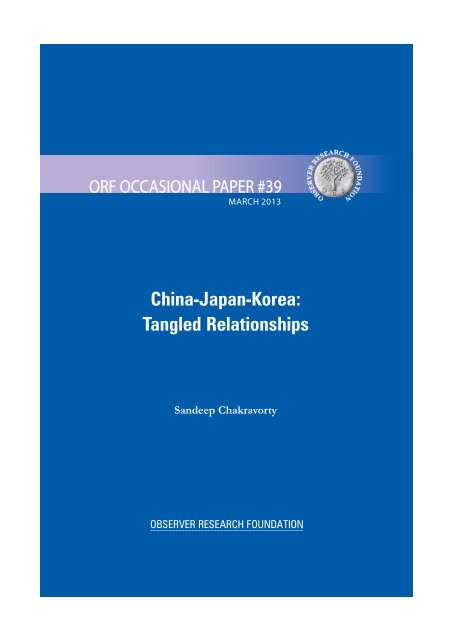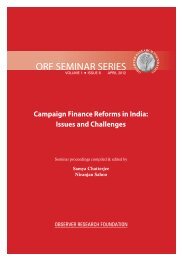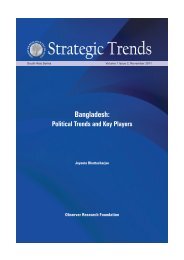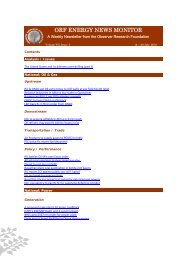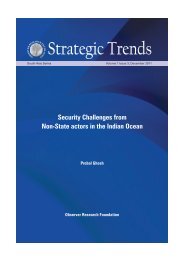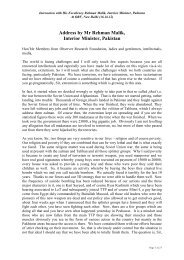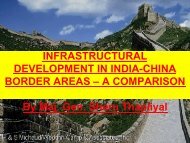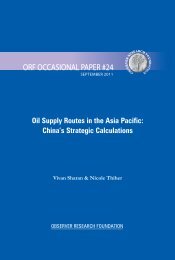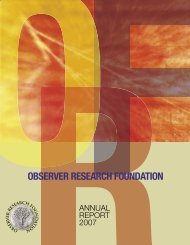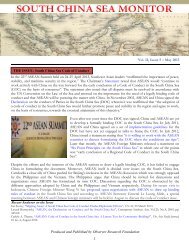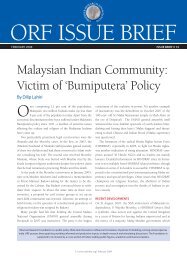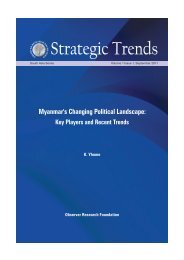Tangled Relationships - Observer Research Foundation
Tangled Relationships - Observer Research Foundation
Tangled Relationships - Observer Research Foundation
Create successful ePaper yourself
Turn your PDF publications into a flip-book with our unique Google optimized e-Paper software.
ORF OCCASIONAL PAPER #39<br />
MARCH 2013<br />
OBSERVER RESEARCH FOUNDATION<br />
China-Japan-Korea:<br />
<strong>Tangled</strong> <strong>Relationships</strong><br />
Sandeep Chakravorty<br />
OBSERVER RESEARCH FOUNDATION
China-Japan-Korea:<br />
<strong>Tangled</strong> <strong>Relationships</strong><br />
Sandeep Chakravorty<br />
OBSERVER RESEARCH FOUNDATION
About the Author<br />
Sandeep Chakravorty, currently Deputy High Commissioner of India in<br />
Dhaka, has been a member of the Indian Foreign Service (IFS) since 1996. He has<br />
served as a diplomat in India’s missions in Madrid and Bogota; in the Ministry of<br />
External Affairs, he has worked as Press Relations Officer as well as on the Eurasia<br />
and East Asia Desks. Before joining the IFS, he worked for five years with Indian<br />
NGOs involved in forestry, environment and watershed development issues. He<br />
holds a Masters Degree in Advanced Studies from Geneva University and a PG<br />
Diploma in Forestry Management from IIFM, Bhopal. He graduated in Physics<br />
from Delhi University.<br />
The views expressed in this Paper are entirely personal and do not reflect the views<br />
and positions of the Government of India.<br />
2013 <strong>Observer</strong> <strong>Research</strong> <strong>Foundation</strong>. All rights reserved. No part of this publication may be<br />
reproduced or transmitted in any form or by any means without permission in writing from ORF.
China-Japan-Korea:<br />
<strong>Tangled</strong> <strong>Relationships</strong><br />
I. Introduction<br />
Territorial disputes between China and Japan over the<br />
Senkaku/Diaoyu islands in the East China Sea and between Japan and<br />
South Korea over the Takeshima/Dokdo islands in the Sea of Japan have,<br />
particularly in the second half of 2012, given rise to concerns about peace<br />
and security in North East Asia. Because China, Japan and South Korea<br />
are, respectively, the 2nd, 3rd and 15th largest economies in the world,<br />
potential regional conflict assumes great significance. Currently, the China-<br />
Japan-Korea bilateral relationships are mired in complexities spiced by<br />
historical baggage, emotions and strong nationalist fervour. The story of<br />
these tangled relationships is a litany of grievances and disputes, emerging<br />
mostly out of Japan's colonial rule over the Korean peninsula and China.<br />
Despite generational change, memories of invasions and atrocities<br />
continue to adversely affect foreign policy. Latent feelings of slight,<br />
disrespect, and disparagement ignite, from time-to-time, national outrage<br />
and upset the delicate regional power equilibrium. As Fareed Zakaria<br />
points out, “Asia's greatest geopolitical problem is that its two great<br />
powers—with the two largest economies and militaries—have an<br />
1<br />
unresolved bitter relationship.” Not surprisingly, in 2012 the convergence<br />
of South Korea and China's territorial disputes with Japan and Japan's<br />
commemorative services at the Yasukuni shrine on the 67th anniversary of<br />
the end of World War II starkly brought to present day political<br />
2<br />
consciousness deeply divisive memories of these three nations. While<br />
www.orfonline.org 1
ORF Occasional Paper<br />
China & South Korea blame Japan for not having done enough to atone for<br />
its wartime atrocities and failing to offer an apology commensurate with<br />
their expectations, Japan believes its contribution towards the economic<br />
3<br />
development of South Korea and China has been expediently overlooked.<br />
At the same time, territorial disputes prevent building enhanced strategic<br />
relations amongst these nations, which could better address the imperative<br />
4<br />
issues relating to North Korean nuclear and missile threats. All three seek<br />
to back territorial claims by upgrading military capabilities, thereby<br />
5<br />
exacerbating lingering strains.<br />
Hence, what could be the most powerful triangle on the international stage<br />
6<br />
is not even in the making. Ironically, the country in North East Asia which<br />
has been the biggest source of tension, i.e. North Korea, has been relatively<br />
peaceful vis-à-vis immediate external relations, despite a recent changing<br />
of guard brought about by Kim Jong-il's death and the succession of his<br />
son Kim Jong-un. Although there is progress, particularly in forging strong<br />
economic and trade ties, latent tensions from historical animosities require<br />
only a pretext to give rise to conflict. Acquisition and testing nuclear and<br />
missile technology by North Korea has raised the spectre of regional<br />
conflict. Japan and South Korea have been at loggerheads with North<br />
Korea, as it steadfastly refused to meet its commitments and chose to opt<br />
7<br />
out of the Nuclear Non-proliferation Treaty (NPT). China's reluctance to<br />
use its considerable clout with North Korea has also created distrust within<br />
South Korea and Japan. So far, considerable economic linkages between<br />
China, Japan and South Korea have not allowed events to get out of hand.<br />
However, this safeguard suffered a serious setback in 2012. The fragile<br />
relationships acquired a shriller tone in recent times due to China's rise and<br />
the perceived economic benefits of territorial possessions in regional seas.<br />
Growing confidence in South Korea, economic stagnation and rising<br />
2<br />
www.orfonline.org
China-Japan-Korea: <strong>Tangled</strong> <strong>Relationships</strong><br />
nationalism in Japan and refusal of Asia-Pacific neighbours to toe China's<br />
line have all contributed to increased instability in North East Asia.<br />
China, Japan, North and South Korea have many complexities in their<br />
bilateral relationships with each other. Even the closest bilateral<br />
relationship among the group, between China and North Korea, has its<br />
share of uncertainties and imponderables. China, despite its significant<br />
clout in North Korea, cannot or does not rein in North Korea's nuclear and<br />
missile programme. Similarly, the natural relationship between the two<br />
democracies and US allies, Japan and South Korea, has its own frailties,<br />
exposed in the autumn of 2012. To understand these complexities, it is<br />
useful to examine a few issues in detail and the underlying reasons for<br />
certain patterns of behaviour.<br />
II.<br />
China-Japan Relations<br />
Historical contest<br />
While Japan's long chain of invasions and associated atrocities<br />
perpetrated in China between 1894 and 1945 and modern Japan's attitude<br />
towards this past are major issues afflicting current China-Japan relations,<br />
the history predating Japanese invasions reveals a very different picture.<br />
Through the ages, China and Japan have influenced each other through<br />
writing, architecture, culture, religion, philosophy and law. China and Japan<br />
8<br />
never occupied the world stage as equals. For most of the past 500 years,<br />
China was the region's hegemon, and Japan accepted its role as a distant<br />
9<br />
satellite. That changed in the late 19th century, as Japan became the first<br />
Asian country to modernise its economy and society, catching up with the<br />
West. With the Meiji Restoration, Japan began viewing China as an<br />
antiquated civilization, unable to defend itself against the West. Japan<br />
www.orfonline.org 3
ORF Occasional Paper<br />
became militarily strong, and in 1895 it defeated China's Qing dynasty,<br />
gaining control of Taiwan. This was seen as an affront to China, which<br />
10<br />
always felt entitled to the mantle of regional leadership. The other<br />
consequence of the war, one with modern-day ramifications, was Japan's<br />
annexation of the Senkaku/Daioyu islands.<br />
Upon the establishment of the People's Republic of China (PRC) in 1949,<br />
pragmatism led to improving of relations with Japan. They established<br />
diplomatic relations on September 29, 1972. However, negotiations for a<br />
Sino-Japanese peace and friendship treaty, which began in 1974, were<br />
broken off in September 1975. As happened in the autumn of 2012, an<br />
April 1978 dispute over territorial rights to the Senkaku/Diaoyu islands<br />
flared up, disrupting peace treaty talks. However, talks were resumed in July<br />
1978, and the Treaty came into effect on October 23, 1978. Close<br />
cooperation emerged in many areas, particularly trade and investment.<br />
Since normalisation of relations, both countries have sought to prevent<br />
dispute over the islands from taking centre stage. Despite misgivings and<br />
lacking trust between both sides, economic pragmatism and geo-political<br />
considerations, including America's active regional role, has ensured peace.<br />
The fine balance maintained started to fall apart in 2010, with a series of<br />
incidents in the South and East China Seas. These involved China and its<br />
maritime neighbours—notably Japan, Philippines and Vietnam—over<br />
disputed islands and Exclusive Economic Zones (EEZ). These disputes in<br />
some ways reached their 2012 crescendo between Japan and Philippines.<br />
Senkaku/Diaoyu Islands<br />
11<br />
The disputed Senkaku/Diaoyu islands are located in an area rich in<br />
fisheries and said to contain significant hydrocarbon resources. When the<br />
US occupation of Okinawa ended in 1972, the islands were returned to<br />
Japan. However, both Taiwan and China were quick to claim them. Japan<br />
4<br />
www.orfonline.org
China-Japan-Korea: <strong>Tangled</strong> <strong>Relationships</strong><br />
has laid claim to the islands since the 1800s. China sees this claim as an<br />
initial assertion of power by imperial Japan. Chinese claims in the South<br />
and East China Seas, where it believes its EEZ to extend, is seen as a<br />
challenge to maritime neighbours. Sovereignty over the Senkaku/Diaoyu<br />
12<br />
would allow China to extend its EEZ right up to Japan's territorial waters.<br />
While most of the region resents China's maritime expansionism, China<br />
13<br />
sees Japan's maritime designs as troublesome. Although, the two nations<br />
have the same amount of coastline, Japan by some estimates (by virtue of<br />
being an archipelago) claims an EEZ of 4.5 million square km, five times<br />
14<br />
greater than China. China's rise, which allowed it to surge past Japan as the<br />
world's second largest economy, has further aggravated Japanese<br />
sentiment.<br />
On September 7, 2010, a Chinese fishing trawler collided with two<br />
Japanese Coast Guard patrol boats near the Senkaku/Diaoyu islands. The<br />
trawler's captain was arrested by Japanese sailors, sparking diplomatic<br />
tensions. China resorted to retaliatory action, arresting Japanese tourists on<br />
trumped-up charges. More damagingly for Japan, China imposed<br />
restrictions on the export of rare-earths, which are critical for Japan's hitech<br />
industry. This severely damaged Japanese confidence regarding China<br />
as a reliable partner. In the face of mounting pressure from China and US<br />
15<br />
intervention, Japan released the fishing boat captain after two weeks.<br />
The latest round of recriminations on the Senkaku/Diaoyu islands began<br />
on September 11, 2012, when Japan's central government bought the three<br />
16<br />
islands it did not already own. Ostensibly, it was a bid to foil attempts by<br />
Japanese nationalists to acquire the islands. Shintaro Ishihara, Governor of<br />
Tokyo—a stringent nationalist—intended to buy the islands by<br />
establishing a Senkaku fund. Ishihara claimed his actions were made in<br />
response to the national government's weak reaction to Chinese<br />
www.orfonline.org 5
ORF Occasional Paper<br />
sovereignty claims. China saw Japan's action as blatant provocation and a<br />
means to solidify control over the disputed islands.<br />
Subsequently, both countries have acted in a manner that made matters<br />
worse. Violent anti-Japan protests broke out in more than 100 cities across<br />
China in September 2012. Japanese car makers Toyota and Honda were<br />
forced to close factories in China. Hundreds of Chinese fishing boats<br />
began approaching the islands to assert Chinese claims. They were joined<br />
by an increasing number of Chinese surveillance boats, many coming<br />
dangerously close to Japanese coast guard ships. Not to be over shadowed,<br />
even Taiwan sent a flotilla of boats to attempt a landing on the islands. On<br />
September 18, the anniversary of Japan's 1931 military invasion of China,<br />
the Chinese blogosphere became hyper-active with Japanese<br />
condemnation. On September 17th, China's Foreign Ministry spokesman<br />
Hong Lei said, [the] "gravely destructive consequences of Japan's illegal<br />
purchase were steadily emerging”. Hong made another stark assessment<br />
regarding the cancelling a commemoration of the 40th anniversary<br />
normalising of Chinese-Japanese diplomatic ties, which was scheduled for<br />
September 27. Hong said,<br />
“Previously, all concerned in China and Japan hoped that through<br />
this anniversary they could further advance relations between<br />
China and Japan. But due to Japan's erroneous action of illegally<br />
buying the Diaoyu Islands many plans have been ruined and<br />
currently many activities have been affected. The culpability<br />
17<br />
entirely lies with Japan.”<br />
China and Japan: Conflict amidst Cooperation<br />
According to Kazuko Mori of Waseda University, “The huge<br />
contradiction at the centre of Japan-China relations is that politics and<br />
6<br />
www.orfonline.org
China-Japan-Korea: <strong>Tangled</strong> <strong>Relationships</strong><br />
18<br />
economics are moving in completely opposite directions”. In 2011,<br />
bilateral trade reached US$ 349 billion, and Japanese investment in China<br />
reached $6.3 billion, ranking 3rd behind Hong Kong and Taiwan. China<br />
was Japan's largest trading partner in 2011, and Japan is China's second-<br />
19<br />
biggest trading partner after the United States. Japan is also China's largest<br />
outside investor, with Japanese companies employing about 10 million<br />
20<br />
Chinese nationals. The latest round of disputes had an adverse effect on<br />
21<br />
trade, as indicated by data from China's General Customs Administration.<br />
During the first eight months of 2012, trade fell 1.4 percent (to $218.7<br />
22<br />
billion) after growing by 14.3 per cent in 2011. The role of political<br />
tensions in this decline cannot be ignored. Growth of Japanese investment<br />
in China also slowed, growing 16 percent in the first eight months of 2012<br />
23<br />
compared to a 50 percent rise over the same period in 2011.<br />
While the two countries are economically tied, Japan has a higher<br />
dependence on China than vice-versa. Japanese exports to China<br />
constitute around 50 percent of trade volume and about 20 percent of its<br />
total exports. Consequently, China has leverage over Japan regarding the<br />
24<br />
imposition of trade restrictions. Japanese automakers, electronics<br />
companies and even supermarkets and convenience stores are heavily<br />
invested in China, in part to escape the shrinking demand at home.<br />
Professor Kazuo Yukawa of Asia University, Tokyo says, “China and Japan<br />
25<br />
need each other, but honestly speaking, Japan needs China more”.<br />
Japanese feel strongly about sovereignty but not at the expense of<br />
26<br />
business. The value of the economic ties may also explain why the<br />
Japanese reaction has been muted and why even China worked to roll back<br />
the protests over the disputed islands after the initial reaction. There is also<br />
a great deal of business complementarity, as Chinese industry depends on<br />
high technology imports from Japan. Japan's technological prowess<br />
continues to provide much of the production machinery in Chinese<br />
www.orfonline.org 7
ORF Occasional Paper<br />
factories and many core components in Chinese-made products, both of<br />
which helped make China's rise possible. Japan's struggling electronics<br />
industry, in turn, is dependent on sales to China's lower-cost<br />
manufacturers. On the other hand, low-priced Chinese goods have been<br />
embraced by consumers in Japan, who are affected by declining wages and<br />
economic stagnation.<br />
Economic dependence between Japan and China and China and the US is<br />
helping to cool the dispute. However, according to Victoria Hui of Notre<br />
Dame University, neither China nor Japan has an easy exit strategy from the<br />
27<br />
tensions. For Japan, China's untrammelled rise is a serious threat to its<br />
influence in the region and the world. There is an urge to challenge China<br />
either directly or in unison with other partners. Consequently, Japan veers<br />
28<br />
between accommodating China and competing with it. The dispute over<br />
the islands is not really over fishing, oil and gas. Rather, Japan fears that if it<br />
makes concessions to China, China will sense weakness, preparing the next<br />
29<br />
demand. For Japan, the rising nationalistic feeling has let a small but vocal<br />
30<br />
group of nationalists, such as Ishihara, drive the island agenda. The desire<br />
to avoid looking weak constrains Japan's options for Japan does not want a<br />
repeat of 2010 when it was forced to release the Chinese captain. In<br />
November 2012, Japan's Prime Minister Yoshihiko Noda announced new<br />
elections. On December 16, 2012, the Liberal Democratic Party (LDP), led<br />
by former Prime Minister Shinzo Abe, returned to power. Even before the<br />
election, Abe pronounced his views on Chinese relations. He told an<br />
interviewer that “he expects the current bilateral tensions over disputed<br />
islands in the East China Sea to continue at least for several more months.<br />
What we have now are furious fights between coast guards. For now, we<br />
need to focus on making sure we defend these islands. We need to display<br />
31<br />
our strong resolve and action."<br />
8<br />
www.orfonline.org
China-Japan-Korea: <strong>Tangled</strong> <strong>Relationships</strong><br />
The China factor has led to a rethink in Japan on the value of Japan-US<br />
relations. There has been back pedalling with regard to the US base at<br />
Okinawa. The Democratic Party of Japan (DPJ) came to power on the<br />
electoral promise of relocating the US base at Futenma in Okinawa.<br />
However, they soon realised that Japan could ill-afford to antagonise the<br />
US, and such plans were shelved. The US-Japan military treaty also involves<br />
US in the islands dispute, as the US is treaty bound to aid Japan in case of<br />
conflict with China. On the other hand, strong Japan-US military ties act as<br />
a balancing and controlling force on Japan. Unwillingness or inability to<br />
support its most important ally in the Asia-Pacific would seriously impair<br />
the US “pivot” formulation and its rebalancing strategy, at least in the eyes<br />
32<br />
of China's Asian neighbours. In her 18 January 2013 remarks to the<br />
media, during the visit of the new Japanese Foreign Minister Fumio<br />
Kishida. Secretary of State Hillary Clinton said:<br />
“With regard to regional security, I reiterated longstanding<br />
American policy on the Senkaku Islands and our treaty obligations.<br />
As I've said many times before, although the United States does not<br />
take a position on the ultimate sovereignty of the islands, we<br />
acknowledge they are under the administration of Japan and we<br />
oppose any unilateral actions that would seek to undermine<br />
Japanese administration and we urge all parties to take steps to<br />
prevent incidents and manage disagreements through peaceful<br />
33<br />
means.”<br />
When the latest round of disputes over the islands broke out in the autumn<br />
of 2012, US Defence Secretary Leon Panetta rushed to the region to<br />
counsel restraint. Japan has also tried to build relations with other Asian<br />
powers such as India, Vietnam and Indonesia, in the hope that these ties<br />
will help Japan to deal more effectively with China's rise.<br />
www.orfonline.org 9
ORF Occasional Paper<br />
China has no easy exit strategy from the tensions. Japan is unlikely to do<br />
anything to make China happy. Unless Japan surrenders control of the<br />
islands, a virtual impossibility, China will have no successes to show,<br />
34<br />
making it seem weak. China fears that if it fails to press its case, America<br />
35<br />
and other Asia-Pacific neighbours will be free to scheme against it. China<br />
is critical of the 2011 Japan Defence White Paper, which mentions the<br />
"China threat theory". China remains unsatisfied on a number of fronts<br />
with Japan, including Taiwan, Senkaku/Diaoyu, war reparations and<br />
Japanese chemical weapons discarded in China. “Anger at Japan is real and<br />
enduring in China. Years of patriotic education have deepened the wounds<br />
36<br />
of Japanese wartime depredations.” China and Japan continually debate<br />
over the actual total killed in the 'Rape of Nanking'. These disputes have<br />
stirred enmity against Japan from the global Chinese community, including<br />
Taiwan. Despite the apologies from Japan, many Chinese feel there is a lack<br />
of true remorse for the wartime crimes. This is reinforced by past visits by<br />
Japanese Prime Ministers to the Yasukuni Shrine, viewed as a symbol of<br />
Japan's militarism. Wenfang Tang and Benjamin Darr concluded in a<br />
September 12 paper, “Nationalism serves as a powerful instrument in<br />
impeding public demand for democratic change.” Based on surveys<br />
conducted in the past decade, the paper concludes that China had the<br />
highest level of nationalism amongst 36 countries and regions surveyed.<br />
37<br />
Japan was not far behind.<br />
China obviously carefully assesses the strength of American commitment<br />
38<br />
to the Asia-Pacific. While China is critical of US regional intervention, it<br />
sees value in the US-Japan military alliance for its moderating influence on<br />
Japanese conduct. China knows that the US-China relationship is too<br />
important to be disrupted by Japan. Despite close China-US ties,<br />
particularly economic (so called G-2), there is a great deal of competition<br />
between the two. The US 'pivot' or rebalancing strategy has definitively<br />
10<br />
www.orfonline.org
China-Japan-Korea: <strong>Tangled</strong> <strong>Relationships</strong><br />
increased its role in East Asia. During the March-April 2012 China-<br />
Philippines spat over sovereignty of the Scarborough shoals, the<br />
Philippines directly appealed for US support, thereby angering China.<br />
Since March 2009, the US has heightened regional interest by contesting<br />
Chinese supremacy. Obviously, China perceives US support for Vietnam<br />
and the Philippines as standing up to China in territorial disputes. In the<br />
context of the China-Japan dispute, a commentary carried by the People's<br />
Liberation Army (PLA) Daily on 12 September noted:<br />
“The Japanese government should not anchor its hopes on the<br />
'U.S.-Japan Security Treaty', which can serve at best as a mere<br />
'whetstone' on which the Chinese military will convert pressure<br />
into power. On the other hand, Japanese people should really think<br />
carefully about when the Uncle Sam can be trusted, and when the<br />
39<br />
U.S. has ever truly abandoned its own interests for others?”<br />
III.<br />
Japan-South Korea Relations<br />
Japan and the Koreas (South and North) have deep historical<br />
animosities fuelling nationalistic feelings. These surface from time-to-time,<br />
causing setbacks to an otherwise healthy economic relationship, between<br />
Japan and South Korea. The depth of sensitivities is such that even<br />
mundane issues, such as Kimchi, can be subject to bilateral dispute. In the<br />
1990s, a dispute arose regarding the marketing of Kimchi, a traditional<br />
Korean dish. Japanese Kimchi manufacturers were significantly increasing<br />
production during this time. Korean manufacturers argued that Japanese<br />
Kimchi is fundamentally different, as Japanese manufacturers skip<br />
traditional processes.<br />
www.orfonline.org 11
ORF Occasional Paper<br />
Takeshima/Dokdo Islands<br />
More seriously, in 2012 territorial disputes over the contested Liancourt<br />
40<br />
Rocks led to a setback in relations. Known as Takeshima (Bamboo Island)<br />
in Japan and Dokdo (Rock island) in South Korea, these islets measure<br />
about 19 hectares in area. They are located almost 200 kilometres from<br />
both Japan and South Korea in the Sea of Japan. These uninhabited rocks<br />
are generally insignificant, except in the minds of South Koreans and<br />
Japanese, where they have invited brinkmanship. Tensions between South<br />
Korea and Japan over Dokdo have been simmering over the last couple of<br />
years, reaching a peak in early August 2012. The then-President of South<br />
Korea, Lee Myung-bak, became the first leader to visit the islets. President<br />
Lee added salt to Japanese wound by announcing that if Emperor Akihito<br />
of Japan ever wishes to visit South Korea, he first needed to apologise for<br />
Japan's colonial rule of the Korean peninsula. This led to a flurry of<br />
invectives from Japan, with then-PM Noda denying that Japan's imperial<br />
army ever forced Korean women to work as comfort women, which<br />
infuriated South Korea. Tensions grew to the point that South Korea<br />
planned military exercises on the disputed islets and both countries<br />
cancelled a currency swap deal earlier agreed upon. The quarrel reached<br />
ludicrous levels when PM Noda sent a letter of complaint to President Lee,<br />
41<br />
who declined to accept it. President Lee sent the letter back to Gaimusho<br />
via a Korean diplomat, and Japan refused to accept it. Eventually, South<br />
Korea was able to mail the letter to Gaimusho.<br />
In its 1951 peace treaty with Allied Forces, Japan relinquished most Korean<br />
territory occupied during WW II. However, Japan insists that the islets<br />
were exempted, since they were declared as part of Shimane prefecture in<br />
1905, five years before the Japan annexed the Korean peninsula. In 1952,<br />
South Korean President Syngman Rhee unilaterally took control of the<br />
12<br />
www.orfonline.org
China-Japan-Korea: <strong>Tangled</strong> <strong>Relationships</strong><br />
islets by declaring a maritime demarcation line, and in 1954 he sent troops<br />
to occupy the islets. Japan has since described this as illegal occupation.<br />
South Koreans see the islets as a sacred place to be protected at all costs.<br />
Since 2005, when Seoul began allowing tourists into the islets, visits have<br />
become like pilgrimages. In 2011 alone, 180,000 South Koreans made the<br />
th<br />
arduous trip. 25 of October every year is commemorated as Dokdo Day<br />
in South Korea, and Dokdo awareness campaigns have become a regular<br />
occurence. In recent years, Seoul has taken a series of steps to strengthen<br />
its claim over the island, including the expansion of a naval airbase on the<br />
nearby island of Ulleung to boost Dokdo defences. For South Korea, the<br />
issue is about territory and righting a historical wrong, i.e., the 36 year<br />
Japanese occupation of the peninsula. Japan considers Takeshima to be<br />
strategically important. It served as a temporary watchtower for Japan<br />
during the Russo-Japanese War and for the US during the Korean War.<br />
Although it covers a miniscule area, sovereignty would allow Japan to gain<br />
42<br />
control over the EEZ around it and resources lying therein. The island's<br />
43<br />
strategic location is fuelling the sovereignty debate.<br />
The unprecedented visit by President Lee to the islets is intriguing because<br />
he had been trying to establish strong South Korea-Japan relations since<br />
the start of his term in 2008. However, South Korea-Japan relations have<br />
historically seen both warm and cold phases go sour in the final year of<br />
presidential terms. The most credible explanation for President Lee's<br />
actions was a desire to shore up his approval ratings. However, because<br />
South Korean presidents can be elected to only one term, such behaviour<br />
remains inexplicable. Unfortunately, these actions have generated<br />
reactions in Japan, even though Takeshima has so far not been a political<br />
hot potato.<br />
www.orfonline.org 13
ORF Occasional Paper<br />
Comfort Women<br />
The euphemism "comfort women" (ianfu) was coined by imperial Japan to<br />
refer to young women of various ethnic and national backgrounds and<br />
social circumstances forced to offer sexual services to Japanese troops<br />
before and during the Second World War. The Tokyo tribunal did not<br />
punish any Japanese leaders for the abuse of comfort women. According<br />
44<br />
to C. Sarah Soh, it is believed that most of the estimated 50,000-200,000<br />
comfort women were Koreans. Even today, many surviving comfort<br />
women, now in their 80s, protest in front of the Japanese embassy in Seoul<br />
every Wednesday.<br />
As they continue to strive for acknowledgment and a sincere apology, the<br />
Japanese court system has rejected their compensation claims citing lack of<br />
evidence. Japan has steadfastly maintained that the San Francisco Peace<br />
Treaty and the 1965 Japan-Republic of Korea Basic Relations Treaty<br />
settled all post-war claims to compensation. Nonetheless, in response to<br />
mounting international pressure to compensate former comfort women,<br />
Japan acknowledged its moral responsibility and established the Asian<br />
Women's Fund (AWF) to express national atonement. From the<br />
perspective of groups demanding state compensation, the AWF is a<br />
convenient ploy aimed at evading legal responsibility. The AWF has been<br />
controversial from its formation in July 1995 and created divisions among<br />
pro-comfort women activists.<br />
Comfort women remained a non-issue for both Japan and South Korea<br />
during the fourteen years (1952-1965) of negotiations to normalise<br />
45<br />
bilateral relations. The 1982 history textbook controversy in Japan, which<br />
epitomised Japan's nationalist view of Korean colonisation, fuelled<br />
tension and disagreement with South Korea (and China) over Japan's post-<br />
14<br />
www.orfonline.org
China-Japan-Korea: <strong>Tangled</strong> <strong>Relationships</strong><br />
war responsibility for colonisation generally and comfort women survivors<br />
in particular.<br />
On January 11, 1992, the Asahi Shimbun reported that Yoshiaki Yoshimi, a<br />
Japanese historian, had discovered several official war documents at the<br />
Library of the National Institute for Defence Studies in Tokyo proving<br />
that the imperial army was involved in establishing and operating the<br />
comfort stations. As a result, the Japanese government issued an apology.<br />
PM Miyazawa formally apologised to the Korean people during his visit to<br />
Korea. In August 1993, the Japanese government admitted that there had<br />
been coercive recruitment in some cases. Yohei Kono, the then-Chief<br />
Cabinet Secretary, stated, “The Japanese army during the war deeply hurt<br />
the honour and dignity of many women.” PM Miyazawa indicated that the<br />
government would create some gesture in lieu of compensation for<br />
survivors.<br />
However, unless Japan officially acknowledges it legal responsibility, Korea<br />
will never accept compensation, so PM Miyazawa's proposal cannot take a<br />
concrete shape. At the legal level, the Japanese government seems desirous<br />
to ward off the possible domino effect that accepting comfort women<br />
claims could have on other non-Japanese war victims. Contemporary Japan<br />
is deeply divided over the comfort women issue. Some progressive lawyers<br />
and grassroots activists are campaigning for legislation that would<br />
authorise an investigation into the comfort women issue, an apology, and<br />
compensation. In contrast, conservative neo-nationalists feel neither a<br />
moral nor legal responsibility for the comfort women survivors.<br />
Sea of Japan or East Sea<br />
Even the name 'Sea of Japan' for the sea between Japan and Korea is<br />
fraught with tension. The South Korean national anthem mentions the sea<br />
www.orfonline.org 15
ORF Occasional Paper<br />
between Japan and Korea as the East Sea. The name naturally creates great<br />
deal of consternation in Korea. It was only in 1928, when the International<br />
Hydrographic Organisation's (IHO) 'Limits of Oceans and Seas' officially<br />
christened the 'Sea of Japan', which eventually influenced other<br />
international documents. Korea believes the IHO only took into account<br />
Japanese views when deciding on the name, as Korea had lost effective<br />
control of its foreign policy during Japanese occupation.<br />
South Korea argues that "East Sea", a common name found on ancient<br />
European maps, should be used instead of or at least concurrently with Sea<br />
of Japan. Japan claims that Western countries named it the Sea of Japan<br />
prior to 1860, before the growth of Japanese influence over Korea after the<br />
1894 outbreak of the First Sino-Japanese War. In 2012 during the Monaco<br />
Conference of the IHO, South Korea mounted a diplomatic offensive to<br />
change the status quo. South Korea did derive some consolation with the<br />
Conference deciding to examine the matter in 2017.<br />
Non-nuclear Japan<br />
For the first time in 34 years, Japan's Diet revised the Atomic Energy Basic<br />
Act in June 2012 by including national security among its goals. In separate<br />
legislation, the Diet also deleted a phrase that had thus far confined the<br />
Japan Aerospace Exploration Agency's activities to “peaceful purposes”.<br />
This triggered widespread uproar in South Korea, particularly in the media.<br />
The Korea Times in an editorial said that Japan, hitherto a 'virtual nuclear<br />
power', had taken the first step towards becoming a 'real' one by enacting<br />
the legislation. Korean media further pointed out that Japan has a sufficient<br />
stockpile of weapons grade material technological prowess to quickly<br />
fabricate roughly 6,000 Hiroshima-level bombs. Korea knows that Japan<br />
was one of the last nations to sign the NPT in 1970 and only ratified it six<br />
16<br />
www.orfonline.org
China-Japan-Korea: <strong>Tangled</strong> <strong>Relationships</strong><br />
years later when the US promised not to interfere with Tokyo's acquisition<br />
of plutonium and pursuit of independent reprocessing capabilities at<br />
46<br />
commercial power plants. As Korea sees it, Japan has built up its nuclear<br />
capability since the late 1950s, while pursuing civilian nuclear and space<br />
47<br />
programmes. Japan successfully put its first rocket into orbit in 1970 and<br />
mastered the nuclear fuel cycle in the 1980s.<br />
Korean Re-unification<br />
Japan has its own perspective on Korean unification. While China may not<br />
be in favour of re-unification, doubt also exists as to whether Japan favours<br />
this move. Japan would have its own set of worries on how to deal with a<br />
unified Korea. Japan does not have diplomatic relations with North Korea,<br />
and relations between the two have bordered on hostility, particularly due<br />
to nuclear and missile tests conducted by North Korea. There has been<br />
little progress in returning Japanese nationals kidnapped by North Korea.<br />
An eventual re-unification must also address the question of whether<br />
unified Korea will be nuclear or non-nuclear. In 1957, the US renounced an<br />
article of the armistice agreement and introduced nuclear weapons in<br />
South Korea. In 2003 North Korea withdrew from the NPT. As Immanuel<br />
Wallerstein points out, neither China, the US, Japan or even Russia are<br />
48<br />
really in favour of Korean re-unification. All prefer the status quo.<br />
Japan- South Korea: Conflict amidst Cooperation<br />
For Japan, the linking of various issues (i.e. rightful ownership of the<br />
Liancourt rocks, justice for comfort women and excesses committed by<br />
Japan during colonial occupation) is unreasonable. The dominant feeling in<br />
Japan is that it has atoned enough for its sins in Korea, including setting up<br />
the AWF to provide comfort women's compensation. Notably, Japan has<br />
www.orfonline.org 17
ORF Occasional Paper<br />
made efforts to improve relations with China and Korea. All three DPJ<br />
Prime Ministers–Yukio Hatoyama, Naoto Kan and Yoshihiko<br />
49<br />
Noda—refrained from visiting the Yasukuni shrine. With respect to<br />
Korea, in October 2011 Japan returned five historically significant copies<br />
of treasured ancient royal documents dating back to Korea's Joseon<br />
dynasty (1392-1897). In December 2011, 1,200 volumes of historic<br />
50<br />
archives, including 150 royal texts known as the Joseon Wangsil Uigwe, were<br />
returned to South Korea. Nevertheless, nationalist fervour continues to<br />
grow in South Korea. There have been extreme demonstrations of such<br />
passion that protestors severed their fingers in front of the Japanese<br />
Embassy in Seoul.<br />
How the territorial dispute between South Korea and Japan will pan out<br />
remains uncertain. If allowed to linger, it will affect bilateral relations,<br />
51<br />
including security cooperation. In June 2012, South Korea was scheduled<br />
to sign the General Security of Military Information Agreement<br />
(GSOMIA), which creates a procedural framework for exchanging military<br />
information between the two countries. However, South Korea postponed<br />
52<br />
the signing at the last minute due to domestic opposition. The two were<br />
also close to concluding an Economic Partnership Agreement. At the<br />
trilateral China-Japan-South Korea level, there have been negotiations for<br />
Free Trade Agreement, which may now hit turbulence. Newly elected<br />
Japanese PM Shinzo Abe reached out to South Korea's President-elect<br />
Park Geun-hye in early January 2013, sending LDP lawmaker Fukushiro<br />
Nukaga as special envoy with a message of mending ties. The special envoy<br />
delivered an invitation letter from Abe to Park, which hoped that “the<br />
launching of new Governments in both countries will mark a good starting<br />
53<br />
point in both countries”.<br />
18<br />
www.orfonline.org
China-Japan-Korea: <strong>Tangled</strong> <strong>Relationships</strong><br />
IV.<br />
China–South Korea Relations<br />
Koreans have been traditionally nervous towards China due to<br />
historical claims surrounding Goguryeo and related kingdoms. China's<br />
controversial Northeast <strong>Research</strong> Project, claiming that Goguryeo and<br />
other various Korean kingdoms, (including Gojoseon, Buyeo and Balhae),<br />
are Chinese tributary states, sparked a massive uproar in South Korea when<br />
first publicised in 2004. China participated in the Korean War when it sent<br />
the People's Volunteer Army to battle United Nations troops in October<br />
1950. UN forces were successfully driven out of North Korea, but China's<br />
own offensive into South Korea was repelled. The Korean War ended by<br />
July 1953, resulting in the establishment of the Korean Demilitarized Zone<br />
and the eventual withdrawal of Chinese forces. Throughout the Cold War<br />
there were no official relations between communist China and capitalist<br />
South Korea. China maintained close relations with North Korea, and<br />
South Korea maintained diplomatic relations with Taiwan. Establishment<br />
of formal diplomatic relations on August 24, 1992 between Seoul and<br />
Beijing paved the way for ties to prosper. South Korea and China have a<br />
flourishing trade and investment relationship engendering a great deal of<br />
dependency.<br />
However, at the political level, South Korea remains unhappy with Beijing<br />
for not doing enough vis-à-vis North Korea. Beijing is politically close to<br />
Pyongyang, and relations between the South and North Korea remain<br />
distrustful. South Korea expected China's endorsement of a report by<br />
international investigators, who concluded that the South Korean naval<br />
ship Choenan, which sank on March 26, 2010 killing 46 seamen, had been<br />
hit by a North Korean torpedo. China has also done precious little to<br />
contain North Korea's nuclear and missile programmes, which directly<br />
adversely affect South Korean security.<br />
www.orfonline.org 19
ORF Occasional Paper<br />
V. North Korea: Common Problem?<br />
As a direct consequence of the Korean War, Japan and South Korea<br />
54<br />
do not have diplomatic relations with North Korea, unlike China. Owing<br />
to the North Korean regime's character and its pursuit of nuclear weapons<br />
and missile technologies, both Japan and South Korea contend that<br />
55<br />
regional peace and security are threatened. However, Beijing loathes<br />
exercising influence on North Korea and has been instrumental in limiting<br />
international pressure and action against the country. This attitude adds an<br />
additional layer of tension between China on one side and Japan and South<br />
Korea on the other. The Six Party Talks (SPT) mechanism—involving<br />
North Korea, South Korea, China, Japan, US and Russia—has yet to<br />
engage North Korea in a dialogue to abandon its nuclear and missile<br />
programmes. China finds itself in a quandary vis-à-vis North Korea.<br />
Although it has a close relationship with the country, China does not rule<br />
the roost in Pyongyang. As a responsible world power, China would like its<br />
influence to prevail on its immediate neighbour. Helplessness regarding<br />
North Korea does not befit China's image as a global power. However,<br />
China is acutely aware that the moment it tries to implement the West's<br />
agenda (including that of Japan and South Korea) with North Korea, it<br />
would lose influence with Pyongyang.<br />
VI.<br />
Looking Ahead: Untangled relationships<br />
According to the liberal theory of international relations, peace<br />
prevails among freely trading nations, but free trade is not the only criterion<br />
for peace. Economic cooperation does not necessarily create trust—high<br />
economic interdependence between Germany and Great Britain in the<br />
second half of the 19th century did not prevent the outbreak of World War<br />
I. Similarly, high quantum India-China trade does not necessarily mean<br />
20<br />
www.orfonline.org
China-Japan-Korea: <strong>Tangled</strong> <strong>Relationships</strong><br />
close ties and the resolution of disputes, such as the boundary question. To<br />
guarantee peace, China, Japan and South Korea must trust each other, not<br />
56<br />
just trade with one another. The leaderships have to work to contain<br />
nationalistic fervour from disrupting diplomatic discourse.<br />
Although China has in the last two decades risen as a formidable power on<br />
the international scene, Japan has been and continues to be significant a<br />
player in the North East Asian economic and security sphere, despite its<br />
relative decline. It also continues to enjoy full US support. South Korea, on<br />
the other hand, has recently appropriated international prestige by<br />
acquiring economic clout and being at the forefront of international<br />
57<br />
diplomacy. South Korea, many say, has acquired the stripes for being<br />
assertive. However, South Korea has, particularly with the visit of former<br />
President Lee to the Liancourt Rocks and making pointed remarks at<br />
Japan's Emperor, committed some diplomatic faux pas. These actions<br />
would have surely led to the erosion of South Korean political capital in<br />
both Tokyo and Washington without changing the status quo on the<br />
ground. The new South Korean President Park Geun-hye must take<br />
seriously the offer of PM Abe and mend relations with Japan. All three<br />
countries have considerable economic inter-linkages, with overlapping<br />
trade and investment connections. Co-existence of competition and<br />
cooperation is the essence of these linkages. Disputes and conflict<br />
seriously disrupt them. As all three are economic power houses, the<br />
economic rationale is most likely to mitigate disputes and prevent<br />
escalation.<br />
As seen earlier, there is a severe lack of trust between China and Japan.<br />
Effective diplomacy is based on a rational trust-building processes and not<br />
on letting emotions run wild, yet neither party in the Senkaku/Diaoyu<br />
controversy seems to want to bear the domestic political costs of building<br />
www.orfonline.org 21
ORF Occasional Paper<br />
58<br />
trust. These disputes should be set aside, as no solutions exist to the<br />
conflicting claims—just as India and China have been able to tackle a much<br />
graver problem of the long disputed border by insulating it from other<br />
aspects of the bilateral relationship. China now has much more to gain<br />
59<br />
from cooperation with Japan than from conflict. Harping about past sins<br />
60<br />
and inflaming the island dispute does little good. If China is to become<br />
the predominant regional power, it can only do so with Japan, not against<br />
61<br />
it.<br />
Similarly, on Japan and South Korea, Hitoshi Tanaka says, “In order to<br />
address the diplomatic fallout, the bilateral relationship must be reframed<br />
in such a way that shared interests and cooperation, not history and<br />
62<br />
territorial disputes, take centre stage.” Leaders in both countries need to<br />
recalibrate and re-emphasise the importance of Japan–South Korea<br />
cooperation, not only for the sake of the two countries themselves but also<br />
63<br />
for the region as a whole. Tanaka believes that in order to mitigate the<br />
diplomatic fallout, Japan and South Korea should insulate historical and<br />
territorial issues, preventing them from affecting substantive areas of<br />
64<br />
cooperation. Both countries will benefit if shared interests trump<br />
65<br />
historical animosity. As the Economist suggests in 'Protesting too much',<br />
the lid must be kept on nationalism for peace in North East Asia. The<br />
escalatory dynamic on the high seas is worrisome, and the absence of a<br />
maritime crisis management regime for the East China Sea is even more<br />
66<br />
troubling. The lack of an overarching North East Asian security<br />
architecture is also problematic as no mechanism exists to mediate and<br />
moderate state action. Miscalculation by either side could result in serious<br />
damage and even the loss of life. China, Japan and South Korea must<br />
intensify security cooperation within the framework of trilateral<br />
cooperation.<br />
22<br />
www.orfonline.org
China-Japan-Korea: <strong>Tangled</strong> <strong>Relationships</strong><br />
In the midst of escalating tensions, it is interesting to note how the leaders<br />
of China, Japan and South Korea utilised an opportunity to meet on the<br />
sidelines of the APEC Summit at Vladivostok on September 8, 2012. The<br />
formally scheduled meeting between the leaders of China and Japan was<br />
cancelled. Instead there was a standing 15-minute pull-aside conversation<br />
between President Hu Jintao and Prime Minister Noda. The Japanese PM<br />
“underscored the importance of dealing with the Senkaku Islands from a<br />
comprehensive perspective, effectively calling for China's cooperation to<br />
prevent the dispute from adversely affecting the overall bilateral<br />
67<br />
relations”. According to Chinese Foreign Ministry reports, President Hu<br />
told PM Noda that “he firmly opposes Japan's plan to nationalise islands in<br />
the East China Sea”. President Hu said, “Bilateral ties faced a critical<br />
situation” and criticised the Japanese plan to acquire some of the Senkaku<br />
Islands and bring them under state control. Whatever means Japan uses to<br />
purchase the islands are illegal and invalid, and China firmly opposes such<br />
moves, Hu noted, At the same summit, there was no meeting between PM<br />
Noda and President Lee of South Korea, there was only brief contact and a<br />
handshake. Interestingly, there was a properly scheduled sit-down meeting<br />
between President Hu and President Lee at Vladivostok. With all three<br />
leaders leaving office in 2013, there is hope of reconciliation and dialogue<br />
in North East Asia, particularly as all sides increasingly realise the negative<br />
economic impact of territorial disputes.<br />
Trilateral Cooperation: The NEATS way<br />
Commander Sarabjeet Singh of IDSA neatly summarises the conundrum<br />
existing in North East Asia when he says, “The immediate areas<br />
surrounding the three nations could be viewed as geopolitically unstable.<br />
There are rising threats due to varying economies, different forms of<br />
governance, aspirations of nations and the presence of extra regional<br />
powers operating in the area, further compounding the stability factor.<br />
www.orfonline.org 23
ORF Occasional Paper<br />
The relationship with neighbours due to differences on land and at sea has<br />
at times resulted in incidents of varying degrees and conflicts that have and<br />
will always affect stability in their respective regions. These areas are<br />
therefore considered a tight rope walk for political and diplomatic and<br />
68<br />
maritime manoeuvring.” In the post-Cold War era, North East Asia has<br />
been lacking an effective multilateral management system for political and<br />
69<br />
security issues, giving it the apt title of “wasteland for regionalism.”<br />
In 1999, an agreement was reached for heads of state from each of the<br />
three countries to meet on the sidelines of the ASEAN+3 (APT) Summit.<br />
This agreement initially constituted little more than an annual informal<br />
breakfast and was established more to right perceived imbalances between<br />
the 'plus three' countries and ASEAN within the APT, as opposed to any<br />
70<br />
desire to improve problematic relations. In December 2008, trilateral<br />
cooperation formally separated itself from the APT process and acquired<br />
its own identity with the first North East Asia Trilateral Summit (NEATS),<br />
held at Fukuoka, Japan. Since then, NEATS has been held every year.<br />
Significantly, the fifth NEATS Summit took place in May 2012 in Beijing,<br />
before Japan's recent round of disputes with China and South Korea over<br />
the islands. Since then, there has not been any formal high level meeting<br />
among the leaders of China, Japan and South Korea. The sixth NEATS<br />
Summit, to be held in South Korea, will be keenly watched and serve as a<br />
potential ice-breaker for new leadership in all three countries.<br />
NEATS is the mechanism that can take on board the objectives of<br />
multilateral security cooperation in North East Asia. Without such a<br />
mechanism, there was rising tensions between Japan and South Korea and<br />
Japan and China, which became so palpable in 2012. NEATS has to evolve<br />
into a forum allowing participant countries to exchange views and<br />
coordinate differences on common security issues. The institutionalisa-<br />
24<br />
www.orfonline.org
China-Japan-Korea: <strong>Tangled</strong> <strong>Relationships</strong><br />
tion of security cooperation contributes to so called 'confidence building<br />
71<br />
measures', preventive diplomacy and conflict resolving mechanism.<br />
At present, cooperation has expanded to include 58 government-to-<br />
72<br />
government processes. However, security cooperation has been limited,<br />
including the common concern of dealing with North Korea. Ultimately,<br />
NEATS has to become an important part of the emerging security<br />
73<br />
architecture in Asia. NEATS can provide the missing link between<br />
economic cooperation and security cooperation. The three North East<br />
Asian giants have economic cooperation sorted but falter on building<br />
mutual trust and confidence regarding security and territorial issues.<br />
Economic compulsions will force them to roll back nationalistic fervour<br />
and seek peace and tranquillity in the region. NEATS provides a forum for<br />
achieving this objective. However, before that happens, NEATS must<br />
move from functional cooperation to play an effective high-level role on<br />
security issues. This is the hope for North East Asia in order to avoid being<br />
sucked into self-destructive, nationalistic territorial aspirations.<br />
India and the Indo-Pacific<br />
India has vital stakes in the Asia-Pacific region (now increasingly referred<br />
74, 75<br />
to as the Indo-Pacific ) in general and North East Asia in particular.<br />
China, Japan and Korea are India's principal trade, investment and<br />
technology partners. India has Comprehensive Economic Partnership<br />
Agreements with Japan and South Korea, and China is India's biggest<br />
76<br />
trading partner. India also has strategic partnerships with all three North<br />
77<br />
East Asian greats. Close ties with Japan and South Korea have started to<br />
acquire security dimensions. India has a substantive and multi-dimensional<br />
relationship with China, despite the long standing boundary dispute.<br />
Unlike the South China Sea issue, on which India has made public<br />
www.orfonline.org 25
ORF Occasional Paper<br />
78<br />
statements expressing concern for the need to maintain freedom of<br />
79<br />
navigation on the high seas, India has decided against publicly<br />
commenting about recent disputes involving China, Japan and South<br />
Korea. This has been done to avoid further inflaming the situation.<br />
However, one can assume that India advised all three countries in private to<br />
exercise restraint and not allow escalation. India engages with Japan and<br />
the US in a governmental trilateral process. This forum would have<br />
discussed Japan's disputes with South Korea and China. A semi-official<br />
(track 1.5) India-Japan-South Korea trilateral dialogue was also launched in<br />
June 2012 in New Delhi. This forum provides India with the opportunity<br />
to discuss the disputes involving Japan and South Korea and advocate for<br />
caution and restraint.<br />
All three countries are vital economic partners of India, and there is much<br />
to lose from conflict in the region. India would counsel these three<br />
countries to engage more closely on security issues and allow NEATS to<br />
assume a greater role in maintaining peace and security in the region. The<br />
SPT mechanism has so far failed to restrain North Korea. NEATS can also<br />
play a crucial role on this front. Furthermore, as fellow member of the East<br />
Asia Summit (EAS), India would hope the EAS mechanism to be at the<br />
core of any emerging regional security architecture, thereby providing<br />
India a role in maintaining peace and security in a vital part of the Indo-<br />
Pacific strategic space.<br />
***********************<br />
26<br />
www.orfonline.org
China-Japan-Korea: <strong>Tangled</strong> <strong>Relationships</strong><br />
80<br />
Map of Senkaku/Diaoyu Islands<br />
81<br />
Map of Takeshima/Dokdo Islands<br />
www.orfonline.org 27
ORF Occasional Paper<br />
Endnotes:<br />
1. Fareed Zakaria, “China Syndrome”, Time Magazine, November 26, 2012<br />
2. Preeti Nalva, “Japan, South Korean War Memories and Territorial Disputes: A<br />
Dangerous Mix”, IDSA Comment, August 27, 2012<br />
3. Ibid<br />
4. In October 2006 North Korea conducted an underground nuclear weapons test.<br />
6. Ibid<br />
7. Ibid<br />
8. North Korea joined the NPT in December 1985 and opted out of the NPT in January<br />
2003<br />
9. Fareed Zakaria, Op Cit<br />
10. Ibid<br />
11. Odd Arne Westad, “Why China and Japan can't get along”, International Herald Tribune,<br />
January 7, 2013<br />
12. Known as Pinnacle islands in English<br />
13. Ibid<br />
14. Ibid<br />
15. Islands Apart, The Economist, September 15-21, 2012<br />
16. Confided by a US diplomat to the author<br />
17. Reportedly for US$ 26 million<br />
18. Chris Buckley, “China says Japan ties anniversary ruined by island row”, Reuters,<br />
September 21, 2012<br />
19. Martin Flacker and Ian Johnson, “Sleepy Islands and Smouldering Dispute”, New<br />
York Times, September 20, 2012, http://www.nytimes.com/2012/09/21/<br />
world/asia/japan-china-trade-ties-complicate-island-dispute.html? pagewanted=all<br />
20. Ibid<br />
21. Ibid<br />
22. Martin Fackler& Ian Johnson, “Showdown over islands threaten business ties”,<br />
International Herald Tribune, September 22, 2012.<br />
23. Ibid<br />
24. Ibid<br />
25. Rukmani Gupta, “Tensions in the East China Sea: a test case for the US 'Pivot'?, IDSA<br />
Comment, September 14, 2012, http://www.idsa.in/idsacomments/<br />
TensionsintheEastChinaSea_rgupta_140912<br />
26. Ibid<br />
27. Ibid<br />
28<br />
www.orfonline.org
China-Japan-Korea: <strong>Tangled</strong> <strong>Relationships</strong><br />
28. Ibid<br />
29. Westad, Op cit<br />
30. The Economist, Leader, September 22, 2012, page 11<br />
31. Ibid<br />
32. Yuka Hayashi, “Abe resolves to take tough line on China”, Wall Street Journal,<br />
November 22, 2012.<br />
33. Rukmani Gupta, Op Cit<br />
34. Remarks by US Secretary of State after meeting Japanese Foreign Minister Fumio<br />
Kishida, January 18, 2012, http://www.state.gov/secretary/rm/2013/01/<br />
203050.htm<br />
35. Ibid<br />
36. Ibid<br />
37. The Economist, “Protesting too much”, September 22-28, 2012<br />
38. China reacted sharply to remarks made by Secretary Clintons on January 18, 2013<br />
after meeting with Japan's foreign minister regarding the China-Japan islands dispute.<br />
Xinhua called it “unwise” for the US to throw its weight behind Japan while Chinese<br />
Foreign Ministry spokesperson Qin Gang said that China is ” strongly dissatisfied<br />
with and resolutely opposes” the remarks”. Qin also called for Washington to be<br />
“careful in words, cautious in actions” and for it to take “realistic actions to protect the<br />
peace and stability of the region and Chinese-US relations.”<br />
39. Ibid<br />
40. After the French whaling ship that was nearly wrecked in the rocks in 1849.<br />
41. Japan's Foreign Office<br />
42. Ibid<br />
43. Shamshad A. Khan, “Japan-South Korea Diplomatic Standoff over<br />
Takeshima/Dokdo”, IDSA Comment, August 14, 2012<br />
44. C. Sarah Soh, “Japan's Responsibility Toward Comfort Women Survivors”, PRI<br />
Working Paper No. 77, May 2001. Her work has been quoted extensively in this<br />
section.<br />
45. Japanese conservatives have actively engaged in the project to write history textbooks<br />
with a view to fostering self-confidence and pride in being Japanese among school<br />
children. As a result, five of the eight middle-school history textbooks approved for<br />
use from the year 2002 do not mention military comfort women.<br />
46. The Korea Herald, “Tokyo's nuclear move worries neighbours”, June 22, 2012<br />
47. Ibid<br />
48. Immanuel Wallerstein, “The Korean Peninsula: The future of a geopolitical nexus”,<br />
Yaleglobal Online, October 2012<br />
49. Preeti Nalwa, Op Cit<br />
www.orfonline.org 29
ORF Occasional Paper<br />
50. Ibid<br />
51. Takashi Yokota, “Japan vs. South Korea, Diplomacy on the Rocks”, Newsweek,<br />
September 10, 2012.<br />
52. Tetsuya Hakoda and Toru Higashioka, Lee's visit to Takeshima came as a bolt out of<br />
the blue for Japan, Asahi Shimbun, August 11, 2012 http://ajw.asahi.com/article/<br />
asia/korean_peninsula/AJ201208110058<br />
53. Choe Sang-Hun, “Japan seeks to mend strained ties with Seoul”, International Herald<br />
Tribune, January 5-6, 2013.<br />
54. Jae Cheol Kim, “China–DPRK's special relationship of convenience”, East Asia<br />
Forum, July 5, 2011<br />
55. North Korea once again tested a nuclear device on February 12, 2013 despite<br />
warnings from the international community including China. The UN Security<br />
Council condemned the test.<br />
56. Giuseppe Gabusi, “The Senkaku/Diaoyu dispute: can China and Japan trust one<br />
another?” East Asia Forum, November 3, 2012<br />
57. Preeti Nalwa, Op Cit<br />
58. Ibid<br />
59. Odd Arne Westad, Op Cit<br />
60. Ibid<br />
61. Ibid<br />
62. Hitoshi Tanaka, “Japan-ROK relations: defusing tensions to build a regional<br />
partnership”<br />
63. Ibid<br />
64. Ibid<br />
65. Ibid<br />
66. Sheila A. Smith, “Japan, China, and the Tide of Nationalism”, Council on Foreign<br />
Relations, September 19, 2012<br />
67. Japan tries to break ice with neighbors on fringes of APEC, The Asahi Shimbun,<br />
September 10, 2013<br />
68. Sarabjeet Singh Parmar, “Securing Maritime Security and Fostering Cooperation”,<br />
paper presented on behalf of IDSA at India-Japan-South Korea Trilateral Meeting,<br />
June 29, 2012, New Delhi.<br />
69. Jo Yanghyeon, “The Korea-China-Japan Trilateral Summit and Northeast Asian<br />
Security Cooperation”, paper presented at India-Japan-South Korea Trilateral<br />
Meeting, June 29, 2012, New Delhi on behalf of IFANS/KNDA.<br />
70. Joel Rathus, “China-Japan-Korea trilateral cooperation and the East Asian<br />
Community”, East Asia Forum, June 15, 2010.<br />
30<br />
www.orfonline.org
China-Japan-Korea: <strong>Tangled</strong> <strong>Relationships</strong><br />
71. Ibid<br />
72. Ibid<br />
73. Ibid<br />
74. Driven by Asia's economic rise, the Indian Ocean is surpassing the Atlantic and<br />
Pacific as the world's busiest and most strategically significant trade corridor. Onethird<br />
of the world's bulk cargo and around two-thirds of world oil shipments now<br />
pass through the Indian Ocean (IOR-ARC 2012). Regional cooperation to ensure the<br />
safety and security of these vital trade routes will become more important over<br />
coming decades. Some observers have raised a new 'Indo-Pacific' conception of the<br />
Asian region. Under such a conception, the western Pacific Ocean and the Indian<br />
Ocean would come to be considered as one strategic arc. This conception is being<br />
driven by the increased economic interaction between South, Northeast and<br />
Southeast Asia and the importance of the lines of energy supply to Asia from the<br />
Middle East.<br />
75. Rory Medcalf, “The Indo-Pacific strikes back”, The Interpreter, Lowy Institute of<br />
International Policy, November 20, 2012<br />
76. India-Japan Comprehensive Economic Partnership Agreement (CEPA) came into<br />
force on August 1, 2011. India-Korea CEPA came into force in January, 2010.<br />
77. Since December 2006 India has “Strategic and Global Partnership” with Japan.<br />
Following President Lee Myung-bak's visit to India in January 2010 as Chief Guest at<br />
the Republic Day celebrations, India-South Korea relations were elevated to<br />
“Strategic Partnership”. During the visit of Chinese Premier Wen Jiabao to India in<br />
April 2005 India and China established 'Strategic and Cooperative Partnership for<br />
Peace and Prosperity".<br />
78. India hosted Japan and the United States for the 3rd round of their Trilateral Dialogue<br />
in New Delhi on October 29, 2012. The Japanese delegation will be led by Deputy<br />
Vice-Minister of Foreign Affairs Kenji Hiramatsu, the US delegation by Assistant<br />
Secretary of State for South and Central Asia Robert Blake and the Indian delegation<br />
by Joint Secretary (East Asia) Gautam Bambawale (source Ministry of External<br />
Affairs of India, Press Release, October 29, 2012.)<br />
79. In response to a media query on recent developments in South China Sea the Official<br />
Spokesperson of the Ministry of External Affairs of India said: "We have been<br />
following with concern recent developments involving China and the Philippines in<br />
the South China Sea. Maintenance of peace and security in the region is of vital<br />
interest to the international community. India urges both countries to exercise<br />
restraint and resolve the issue diplomatically according to principles of international<br />
law.”, Media Briefings, May 10, 2012, www.mea.gov.in<br />
80. Courtesy: The Economist, http://www.economist.com/news/christmas/<br />
21568696-behind-row-over-bunch-pacific-rocks-lies-sad-magical-history-okinawanarrative<br />
81. Courtesy: The Economist, http://www.economist.com/node/14660487<br />
www.orfonline.org 31
ORF Occasional Paper<br />
Bibliography<br />
Buckley, Chris, “China says Japan ties anniversary ruined by island row, Reuters,<br />
September 21, 2012<br />
http://www.reuters.com/article/2012/09/21/oukwd-uk-china-japanidAFBRE88K0B920120921?feedType=RSS&feedName=worldNews&utm_sour<br />
ce=feedburner&utm_medium=feed&utm_campaign=Feed%3A+reuters%2FAF<br />
RICAWorldNews+%28News+%2F+AFRICA+%2F+World+News%29<br />
Choe, Sang-Hun, Japan seeks to mend strained ties with Seoul, International Herald<br />
Tribune, January 5-6, 2013.<br />
Flacker, Martin and Johnson, Ian, Sleepy Islands and Smouldering Dispute, New York<br />
Times, September 20, 2012, http://www.nytimes.com/2012/09/21/<br />
world/asia/japan-china-trade-ties-complicate-island-dispute.html?pagewanted=all<br />
Fackler, Martin and Johnson Ian, Showdown over islands threatens business ties,<br />
International Herald Tribune, September 22, 2012.<br />
Gupta, Rukmani, “Tensions in the East China Sea: A test case for the US 'Pivot'?<br />
IDSA Comment, September 14, 2012<br />
Gabusi, Giuseppe, The Senkaku/Diaoyu dispute: can China and Japan trust one<br />
another? East Asia Forum, November 3, 2012 http://www.eastasiaforum.org/<br />
2012/11/03/the-senkakudiaoyu-dispute-can-china-and-japan-trust-oneanother/#more-29831<br />
Han, SeungSoo, Heeding History in East Asia, Independent of Bangladesh,<br />
November 28, 2012<br />
Hakoda, Tetsuya and Higashioka, Toru, Lee's visit to Takeshima came as a bolt out of<br />
the blue for Japan, Asahi Shimbun, August 11, 2012 http://ajw.asahi.com/<br />
article/asia/korean_peninsula/AJ201208110058<br />
Hayashi, Yuka, Abe resolves to take tough line on China, Wall Street Journal,<br />
November 22, 2012<br />
Jo,Yanghyeon, The Korea-China-Japan Trilateral Summit and Northeast Asian<br />
Security Cooperation”, paper presented at India-Japan-South Korea Trilateral<br />
Meeting, New Delhi, June 29, 2012.<br />
Khan, Shamshad A, Japan-South Korea Diplomatic Standoff over<br />
Takeshima/Dokdo, IDSA Comment, August 14, 2012<br />
Kim, Jae Cheol, China–DPRK's special relationship of convenience, East Asia Forum,<br />
July 5, 2011<br />
32<br />
www.orfonline.org
China-Japan-Korea: <strong>Tangled</strong> <strong>Relationships</strong><br />
Liank, Yan, Words to soothe Asian passions, International Herald Tribune, October<br />
6-7, 2012<br />
Makito, Saya, The Sino-Japanese War and the Birth of Japanese Nationalism,<br />
International House of Japan, 2011<br />
Medcalf, Rory, The Indo-Pacific strikes back, The Interpreter, Lowy Institute of<br />
International Policy, November 20, 2012<br />
Nalwa, Preeti, Japan-South Korean War Memories and Territorial Disputes: A<br />
Dangerous Mix, IDSA Comment, August 27, 2012 http://www.idsa.in/<br />
idsacomments/JapanSouthKoreanWarMemoriesandTerritorialDisputes_PreetiNa<br />
lwa_270812<br />
Parmar, Sarabjeet Singh, Securing Maritime Security and Fostering Cooperation”,<br />
paper presented at India-Japan-South Korea Trilateral Meeting, June 29, 2012, New<br />
Delhi.<br />
Rathus, Joel, China-Japan-Korea trilateral cooperation and the East Asian<br />
Community, East Asia Forum, June 15, 2010<br />
http://www.eastasiaforum.org/2011/07/05/china-dprk-s-special-relationship-ofconvenience/<br />
http://www.lowyinterpreter.org/post/2012/11/20/The-Indo-Pacific-strikesback.aspx<br />
http://www.eastasiaforum.org/2010/06/15/china-japan-korea-trilateralcooperation-and-the-east-asian-community/<br />
Smith Sheila A., Japan, China, and the Tide of Nationalism, Council on Foreign<br />
Relations, September 19, 2012<br />
http://www.cfr.org/asia/japan-china-tide-nationalism/p29080<br />
Soh, Sarah C., Japan's Responsibility Toward Comfort Women Survivors, PRI<br />
Working Paper No. 77, May 2001.<br />
Tanaka, Hitoshi, “Japan-ROK relations: defusing tensions to build a regional<br />
partnership”, East Asia Insights Vol. 7 No. 4 October 2012<br />
The Asahi Shimbun, Japan and South Korea need calm approach to territorial issues,<br />
August 3, 2011 http://www.asahi.com/english/ TKY201108020267.html.<br />
The Economist, Islands Apart, September 15-21, 2012<br />
The Economist, Leader, September 22, 2012, page 11<br />
The Economist, Protesting too much, September 22-28, 2012<br />
www.orfonline.org 33
ORF Occasional Paper<br />
The Economist, The Senkaku or Diaoyu Islands, Narrative of an empty space,<br />
December 22, 2012<br />
The Korea Herald, “Tokyo's nuclear move worries neighbours”, June 22, 2012<br />
http://www.koreaherald.com/view.php?ud=20120622001028<br />
The Yomiuri Shimbun, South Korea goes overboard in denying lawmakers entry,<br />
August 4, 2011 http://www.yomiuri.co.jp/dy/ editorial/T110803004887.htm.<br />
Wallerstein, Immanuel, The Korean Peninsula: The future of a geopolitical nexus”,<br />
Yale global Online, October 2012<br />
Westad Odd Arne, Why China and Japan can't get along, International Herald Tribune,<br />
January 7, 2013<br />
Yokota, Takashi, Japan vs. South Korea, Diplomacy on the Rocks”, Newsweek,<br />
September 10, 2012.<br />
Zakaria, Fareed, China Syndrome, Time Magazine, November 26, 2012<br />
34<br />
www.orfonline.org
OBSERVER RESEARCH FOUNDATION<br />
<strong>Observer</strong> <strong>Research</strong> <strong>Foundation</strong> is a public policy think-tank<br />
that aims to influence formulation of policies for building a<br />
strong and prosperous India. ORF pursues these goals by<br />
providing informed and productive inputs, in-depth research<br />
and stimulating discussions. The <strong>Foundation</strong> is supported<br />
in its mission by a cross-section of India's leading public<br />
figures, academics and business leaders.<br />
` 195/-<br />
<strong>Observer</strong> <strong>Research</strong> <strong>Foundation</strong><br />
20, Rouse Avenue, New Delhi-110 002<br />
Email: orf@orfonline.org<br />
Phone: +91-11-43520020 Fax: +91-11-43520003<br />
www.orfonline.org


